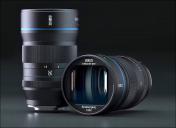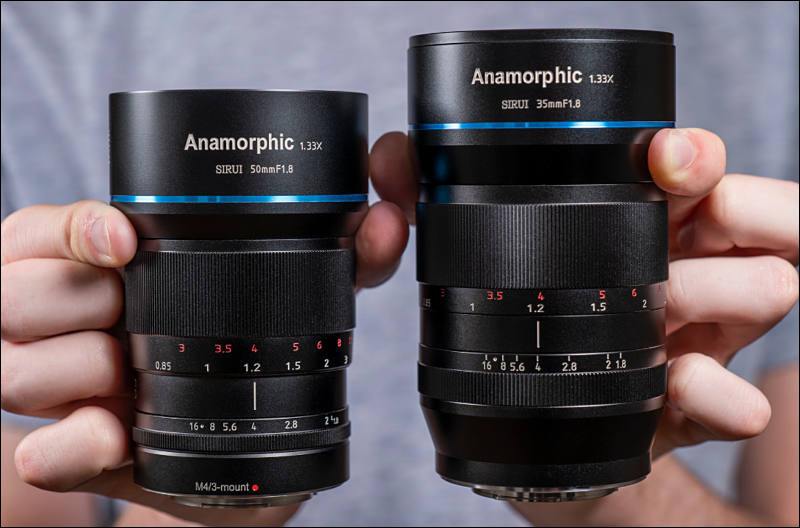
-

 sa13692.jpg800 x 583 - 40K
sa13692.jpg800 x 583 - 40K -
the 35mm has more polished ready image than the 50mm. Wish the work on 2x or 1,8x primes
-
This might be a lot easier than using a vintage projection lens, but it lacks the character of a Kowa 16H / Kowa B&H / Isco. It looks spherical.
Visually, you'd get a lot more interesting look with a Helios plus fishing wire trick for flares.
-
If I knew (verified) there was an EF mount adapter in the works, I'd be all in on the 35mm.
-
PR
Sirui 1.33x anamorphic lenses come to RED Komodo and Canon C70 with MTF Services RF-mount conversion
Affordable 35mm f1.8 and 50mm f1.8 anamorphic lenses now available pre-converted to RF mount by UK lens specialists
MTF Services have released new RF-mount-converted versions of the popular Sirui 1.33x anamorphic lenses. Users of the RED Komodo and Canon C70 can now enjoy using the Sirui 35mm f1.8 and 50mm f1.8 anamorphic lenses to shoot stunning 2.4:1 cinemascope images.
Available from today, the bespoke converted lenses are based on the Micro 4/3 versions of the Sirui 50mm f1.8 and 35mm f1.8. Each lens retains its compact dimensions, allowing for easy handheld or gimbal operation. The conversion needs to be performed by MTF Services and requires precise mechanical modification of the lens to allow fitting of the new mount. The lenses are available pre-converted via authorised MTF Services dealers. The MTF Services RF mount converted Sirui 50mm f1.8 1.33x anamorphic lens on the Canon EOS R.
The Sirui anamorphic lenses are well known for creating a sought-after anamorphic look. The lenses have a 1.33x wider horizontal field-of-view, versus the vertical one. When the pictures are de-squeezed in post-production they turn from standard 16:9 or 17:9 ratio images into cinemascope letterbox ones. The result emulates the look often seen on big motion pictures, with horizontal blue streak highlights and bokeh with elongated defocused areas.
The RED Komodo sensor is fully covered by the image circle of both the Sirui 35mm and 50mm lenses converted by MTF Services. This means that full 6K resolution of the sensor can be used to create anamorphic images.
Canon RF mount camera users can also benefit. The new Canon C70 is fully covered and can create 4K 2.4:1 anamorphic images with the MTF Services converted Sirui lenses. The Canon EOS R 4K video mode is also fully covered.
With the newer Canon EOS R5 the lens image circles do not fully cover the full-frame sensor, but can still be used if the user is prepared to accept the vignette effect and crop the image in post-production (this requires the user to shoot in full-frame mode and then crop the image in post production to the equivalent of around 1.35x crop).
The RF-mount-converted Sirui 50mm f1.8 anamorphic costs £499 (plus tax) for the base lens, plus £150 (plus tax) for the conversion. The 35mm f1.8 anamorphic costs £637 (plus tax) for the base lens, plus £150 (plus tax) for the conversion.
The RF-mount-converted lenses join the existing L-mount-converted Sirui anamorphic lenses announced earlier this week. MTF Services also convert the widely used Fujinon MK 18-55 T2.9 and MK 50-135mm T2.9 Cine zoom lenses to both RF and L-mount, broadening the lens options available to users. Both lenses are available to order immediately from authorised MTF Services dealers or MTF Services website.
-
PR
MTF Services L-mount converted Sirui 1.33x anamorphic lenses unveiled
Bespoke conversion of the popular Sirui 35mm and 50mm lenses by UK lens specialists are now available
Exciting new creative possibilities open up for users of the popular Panasonic LUMIX S1H, S1 and S5 and other L-mount cameras, as MTF Services today announces a new lens duo with immediate availability. The new L-mount converted versions of the affordable Sirui 35mm f1.8 and 50mm f1.8 1.33x anamorphic lenses emulate the sought-after anamorphic look often seen on big motion pictures, with horizontal blue streak highlights and beautiful bokeh with elongated defocused areas.
The bespoke conversion is based on the Micro 4/3 versions of the Sirui 50mm and 35mm. Each lens retains its compact dimensions, allowing for easy handheld or gimbal operation. The conversion requires mechanical modification of the lens to allow fitting of the new mount and needs to be performed by MTF Services. The lenses will be available pre-converted via authorised MTF Services dealers.
The LUMIX S1H, S1 and S5 feature both 4K S35 and 3.5K 4:3 anamorphic modes which can take full advantage of the Sirui lenses image circles. Both lenses have an image circle that completely covers Super35/APS-C. In 4K S35 mode the result once de-squeezed in post production is close to the 2.35:1. Using Panasonic's 3.5K 4:3 mode users can get the anamorphic look while still getting a 16:9 final image - ideal for some TV and commercial users.
Using the L-mount converted Sirui lenses on the LUMIX S1H allows users to get a 16x9 aspect result and still maintain the anamorphic look. (Image credit: Jim Marks) The lenses can be used to cover a slightly larger area if the user is willing to accept some vignetting (this requires the user to shoot in Full-frame 5.9K mode and then crop the image in post production to the equivalent of around 1.35x crop)
London-based DP Jim Marks has been using the lenses and is impressed. He said,"Previously our anamorphic lens options were either ruinously expensive or homemade. The MTF Services L-mount conversions of the Sirui 1.33x 35mm and 50mm are the missing pieces of the puzzle that finally allow Panasonic's anamorphic modes to be used in anger with lenses that are affordable, lightweight and easy to use. The lenses are fast, very sharp and enjoy smooth focus with a throw that aids the solo shooter. On my LUMIX S1H they create a simple handheld package, with the option to shoot regular 4K 16x9 for a 2.4:1 finished aspect, anamorphic 4K S35 mode for a 16x9 finish, or full-frame 5.9K with a slight crop in post for an even wider field of view. Set up like this I have a wonderfully portable combination that is truly fun to shoot with.
L-mount converted Sirui 50mm f1.8 anamorphic costs £499 (plus tax) for the base lens, plus £150 (plus tax) for the conversion. The 35mm f1.8 anamorphic costs £637 (plus tax) for the base lens, plus £150 (plus tax) for the conversion.
Both lenses are available to order immediately from authorised MTF Services dealers or the MTF Services website.
-
Converted version
L mount, E mount, Micro 4/3 mount, RF mount or FZ mount
-
Can anybody prove me wrong? -> Shooting anamorphic and later de-squeezing is nothing more than resizing the image and losing quality regardless of how expensive the anamorphic lens/adapter is.
Creating pixels out of thin air
-
If you de-squeeze by stretching the image horizontally - yes, you create pixels out of thin air.
But you can also de-squeeze by compressing the image vertically, which might even make the image sharper.
But shooting anamorphic with todays 4k cameras is not about getting more information into a given sensor size, its about the characteristics of a lens constructed that way.
-
OK had to try this one. There's a lot of info online, and I don't have much to add except that it's decently sharp, that was a question mark looking at samples.
Unpacked the Sirui 35/1.8 this morning. After a half day of testing, it looks like a no brainer, especially if you own the Z Cam S6. Sharpness is perfectly fine, as is color and contrast. Maybe there is a touch of added color so be careful with the WB. Distortion is as expected, mostly correctable with the built in PP plugin. Or just leave it. Clickless, smooth aperture. There is some color fringing with backlit subjects.
I filmed the tests on the S6 in "open gate" to make full use of the 6K+ S35+ sensor. I was able to view the footy on my monitor desqueezed and also in the app.
I dropped the footy into PP into a standard 8K sequence. Yes, 8k from 6K open gate. Setting the image size to 93 percent, the image just touches the edges while leaving two narrow letterbox strips. Fine--you can add thicker black bars or zoom up to 102 percent to get 8K with no bars. It's all good. You can downsample, crop, whatever you want. Lots of choices.
My copy was shipped direct from the factory and I waited more than a month for it. Glass was perfect, exterior had a tiny scuff mark, no biggie.
You can manual focus very well at F1.8 and then I like to stop it down to F4, but it is certainly usuable wide open.
Clickless aperture and focus is very smooth and there are two rings included for gearing. No hood, which is cheesy for an $800 lens IMHO. :(
@theusualeditor re: thin air pixels--this lens allows me to film open gate on my Z Cam S6, so I'm not losing or cropping any pixels except some in the horizontal which unsqueezes a tiny bit wide. And, here, I'm not losing but cropping oversize. Ordinarily, a lot of these pixels would be unused, just like on most 4:3 or whatever cameras. So this lens get every drop of pixel juice out of the slightly oversized sensor.
So because of the open gate, it's like the extra resolution you get when you used film back in the olden days. And, in H265 I'm getting manageable file sizes.
But, beyond that, it looks cracking when you drop it into an 8K timeline.
(Yes, there are blue flares easy peasy.) P.S. It isn't light.
Howdy, Stranger!
It looks like you're new here. If you want to get involved, click one of these buttons!
Categories
- Topics List23,992
- Blog5,725
- General and News1,354
- Hacks and Patches1,153
- ↳ Top Settings33
- ↳ Beginners256
- ↳ Archives402
- ↳ Hacks News and Development56
- Cameras2,367
- ↳ Panasonic995
- ↳ Canon118
- ↳ Sony156
- ↳ Nikon96
- ↳ Pentax and Samsung70
- ↳ Olympus and Fujifilm101
- ↳ Compacts and Camcorders300
- ↳ Smartphones for video97
- ↳ Pro Video Cameras191
- ↳ BlackMagic and other raw cameras116
- Skill1,960
- ↳ Business and distribution66
- ↳ Preparation, scripts and legal38
- ↳ Art149
- ↳ Import, Convert, Exporting291
- ↳ Editors191
- ↳ Effects and stunts115
- ↳ Color grading197
- ↳ Sound and Music280
- ↳ Lighting96
- ↳ Software and storage tips266
- Gear5,420
- ↳ Filters, Adapters, Matte boxes344
- ↳ Lenses1,582
- ↳ Follow focus and gears93
- ↳ Sound499
- ↳ Lighting gear314
- ↳ Camera movement230
- ↳ Gimbals and copters302
- ↳ Rigs and related stuff273
- ↳ Power solutions83
- ↳ Monitors and viewfinders340
- ↳ Tripods and fluid heads139
- ↳ Storage286
- ↳ Computers and studio gear560
- ↳ VR and 3D248
- Showcase1,859
- Marketplace2,834
- Offtopic1,320













